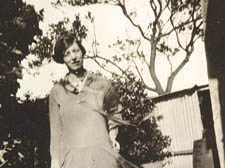|
|
 |
| |
Bloomsbury maid to measureAMONG the myriad artistic offerings of the Bloomsbury Group, Vanessa Bell’s 1939 painting Interior with Housemaid shows a faceless woman sweeping the floor of the artist’s house at Charleston.
While Virginia Woolf, Duncan Grant, Clive Bell, Roger Fry and the rest of the literary circle devoted themselves to creative pursuits, someone was responsible for the humdrum affairs of the house – cooking, cleaning and making the beds.
Now, through the diaries and correspondence of Grace Higgens (pictured), housekeeper to the artists Vanessa Bell and Duncan Grant for more than five decades, the servant in the painting has been given an identity of her own.
Bloomsbury Below Stairs, a temporary exhibition at the British Library, lends truth to the idea that behind every great 19th-century household there was a great housekeeper.
A selection of Mrs Higgens’s letters and photos describe life above and below stairs at Charleston: her encounters with the Woolfs, holidays abroad with the family and amusingly domestic exchanges with some of modern literature’s foremost contributors.
“Mrs Woolf arrived after tea to the great joy of the household, as she is very amusing and helps cheer them up,” she writes. Clive Bell “comes into lunch and as usual [says] some very idiotic remarks making me feel very uncomfortable”; Duncan Grant bequeaths a Valentine’s card while Virginia Woolf pleads: “Could you be so good some time as to write out the recipe, as I can’t get any cakes made except yours that I like to eat?”
Memories of Walter Sickert at a dinner party singing “My Young Man is Sitting in the Gallery” or Frederick Ashton “on a summer afternoon leaping about Charleston lawn with red roses threaded in his hair” mingle with more personal allusions to Grace’s private life: her marriage to Walter Higgens, the Charleston gardener, and the birth of her son, John.
Despite traces of the old class disparity (the Bloomsbury set see nothing wrong in paying their skivvies £40 a year while their income is 100 times that), Grace seems extremely fond of her masters. In 1972 she left Charleston and its sole occupant, an elderly Duncan Grant, to live in a house with her family. “Feeling guilty,” she writes, “I have a dreadful feeling I talked too much and said all the wrong things at Charleston, wished I had kissed
D Grant when I left, as he looked so helpless, wished I was there to take care of him.”
SIMON WROE
|

|
 |
|
 |
|

